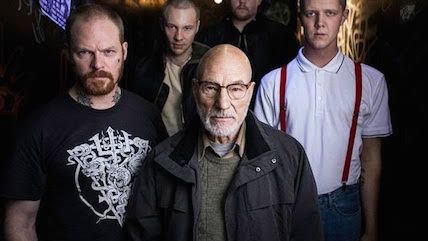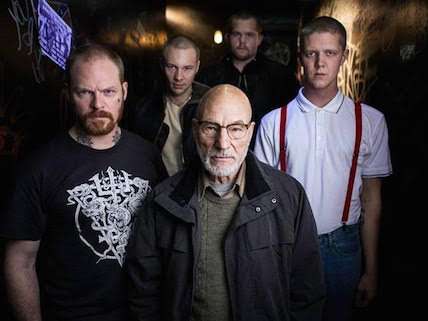Movie Review: Green Room
Patrick Stewart goes dark in an intense skinhead shocker.


The Ain't Rights are out on the road, where rock dreams so often go to die. They're a Virginia thrash band on a tour of the Pacific Northwest, and it's been grim: the venues dismal, the audiences thin, and the per-gig payouts—when they're actually paid out—down in the low double digits. The group is grimy, tired and hungry, and has to siphon gas along the way to keep its grubby van going. Can things get any worse?
Yes. Yes they can. A small-town DJ gets them a gig for good money at a club deep in the Oregon woods. It's a skinhead hangout, and he advises them not to talk politics. They get the picture the moment they arrive. The place is filled with hulking bootboys, and a large Confederate flag on a wall signals their social orientation. Pugnaciously, the band elects to kick off its set with the Dead Kennedys' "Nazi Punks Fuck Off." This triggers a tense moment, naturally, but the Ain't Rights can really play, and they win these lugs over. In the end, everybody's happy. The band gets paid. They're on their way out the door when Pat turns around to retrieve a forgotten cell phone back in the club's green room. There he encounters two young women. One is a strung-out boot girl named Amber (Imogen Poots). The other is Amber's friend Emily. Emily is dead.
In Green Room, writer-director Jeremy Saulnier, who won well-deserved attention with his micro-budget revenge thriller Blue Ruin, does a couple of things really well. As a onetime habitué of the Washington, D.C. hardcore scene, he's able to nail the greasy punk-club ambience—the obscure posters, the graffiti, the soundtrack writhings of Napalm Death, Corpus Rottus, Syphilitic Lust. He brings this dank world alive in an entirely convincing way.
But Saulnier's specialty is artful horror. He's not coy with bloody mayhem—a knife to the head, a ripped-out throat, a loudly cracked arm. He gives us the nasty bits in arterial detail, but he frames them in fresh ways; and once he's rocked us back in our seat, he knows when to move along. He also knows when to apply daubs of humor. The besieged musicians—now inconvenient homicide witnesses—play an ongoing game of desert island discs as they fight for their lives; and at one beleagured moment, when Amber suddenly mumbles, "I'm hungry," Pat slumps in dismay: "I can't die here with you," he groans.
The movie is a cabin-in-the-woods story, basically—isolated youths up against the forces of evil, steadily getting picked off in gruesome ways. But Saulnier keeps the evil ambiguous. The club's amiable manager, Gabe (Blue Ruin star Macon Blair), seems like an okay guy; and when its owner, an older gent named Darcy (Patrick Stewart), arrives on the scene, he's almost courtly. The band members, now with Amber on their side, are continually reassured that everything's going to be fine. ("We're not keeping you, you're just staying.") The police have been called. Just chill. Right.
Attracting Stewart to play the dark schemer Darcy was a coup (and a tribute to Saulnier's compact script). The director's financial backers demanded a star, and in Stewart they got one who lifts this fondly wrought B-movie to another level. Memories of Captain Picard and Professor Xavier fade as the actor soothes his captives with silky patter while at the same time huddling with his thugs in search of the best way to slaughter these troublesome kids and then stage their deaths somewhere far away. (Darcy has a lot to protect—there's more going on at his remote establishment than is immediately apparent.)
As armed skins stalk their prey through the club's after-hours darkness, and machetes and box cutters are brought to bear in defense, the tension builds in an organic way (there are no cheesy boo! moments). The movie is all about style and structure. There's nothing really new about the story—this is a genre picture, and we pretty much know where it's going. But Saulnier is a genre virtuoso, and it's a pleasure to be in such expert hands.


Show Comments (27)